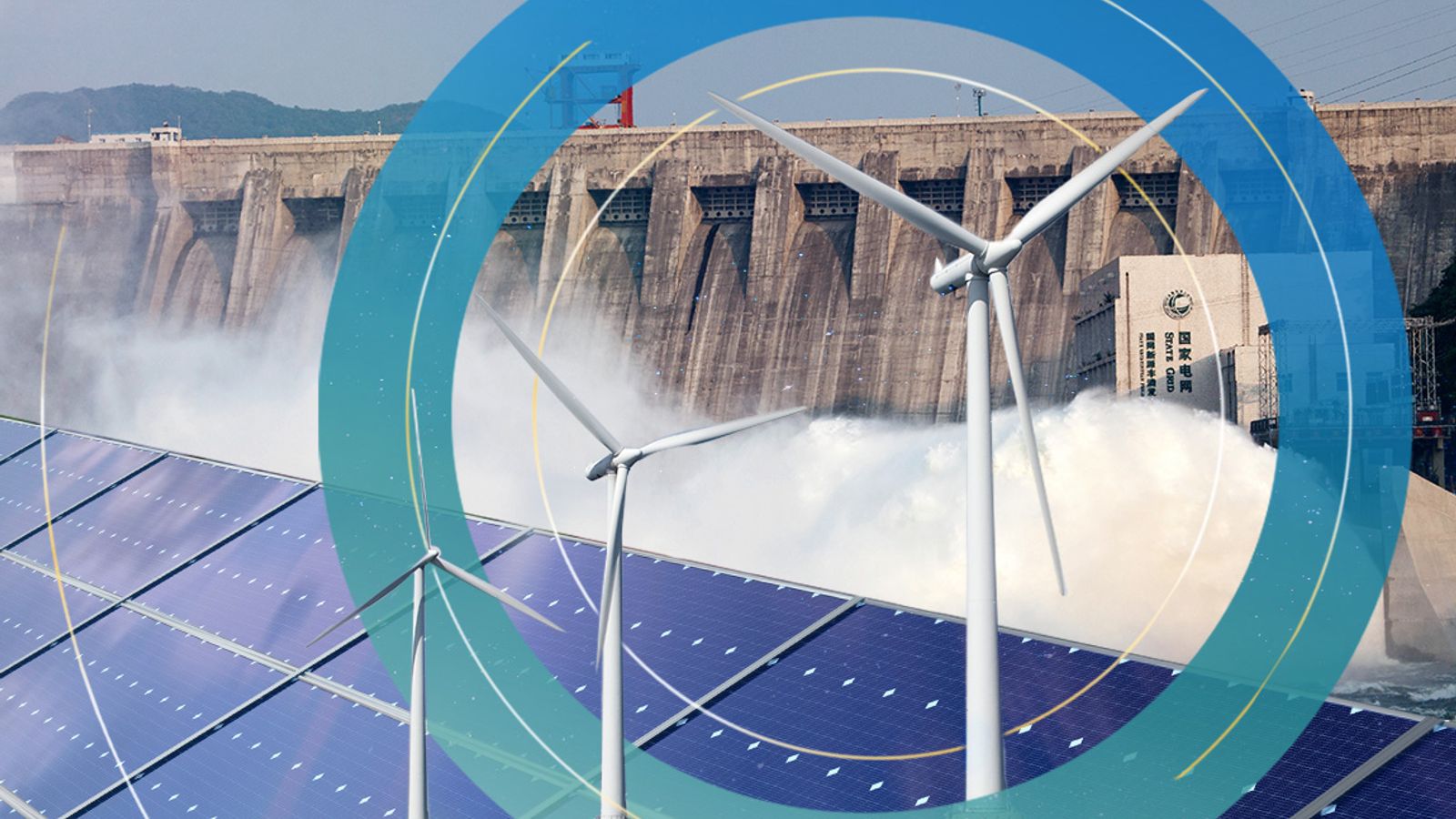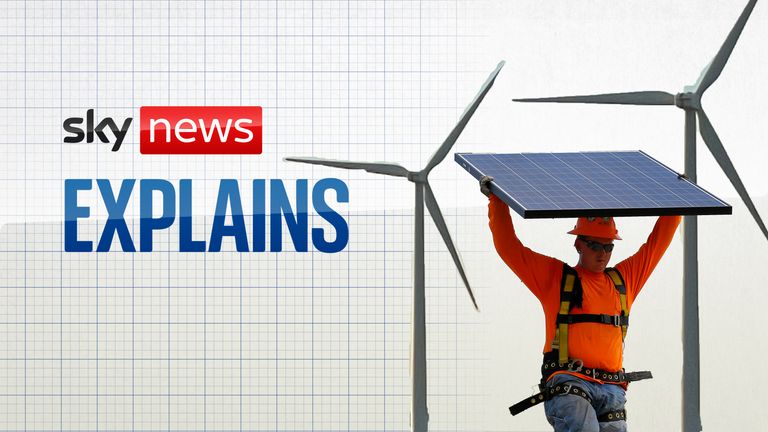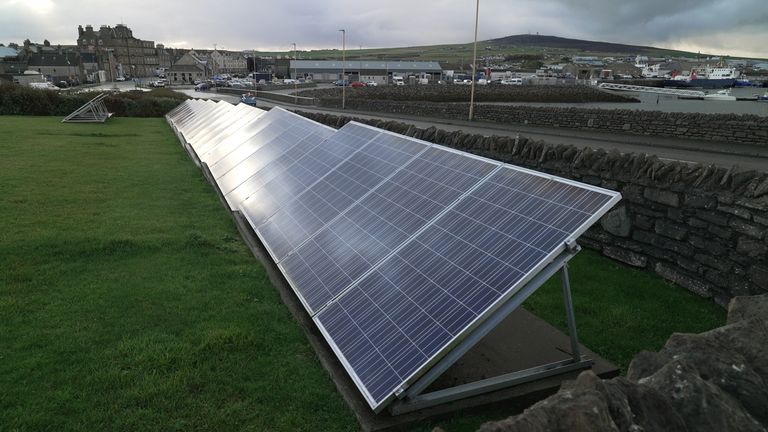Will a move to renewables save us money on our energy bills?
Figures seen by Sky News suggest that the cost of producing energy from wind will be less than half the cost from gas this year, falling to a quarter in 2023.
Only yesterday, the prime minister told wind-industry leaders that he has “an insatiable desire to further maximise supply” of wind energy, as part of his long-term energy strategy to reduce reliance on fossil fuels – something he says is more crucial since Russia’s illegal invasion of Ukraine.
And on the day that a standard energy bill rises by more than 50%, pushing more than a quarter of homes in England into fuel poverty, the fact that wind is cheaper is more important than ever.
Wind is already the second biggest contributor of energy in the UK, having multiplied almost 20 times in the last 10 years.
While the environmental benefits of wind energy have been behind most of its rise so far, the political and economic benefits are key to why plans are being accelerated now.
Using less gas would not only wean us away from a reliance on foreign fuel supplies, it would also limit how much our energy bills are affected by the global prices of gas and oil.
Wind is now cheaper than gas
During the back end of last year, energy from wind became cheaper than gas for the first time, according to Rajiv Gogna, an energy analyst at consultancy firm LCP.
“Last year, existing gas plants would charge about £50 per megawatt hour (MWh) for the energy they produced, but this year it’ll be about £200/MWh and we’d expect this to be about the same in 2023,” explained Mr Gogna.
One MWh is enough to power a home for about 10 weeks, or drive an electric car 3,600 miles.
“The cost of energy from new wind farms will be about £70/MWh this year and there are contracts signed to provide it for £50/MWh in 2023.
“In 2015 it would have been about £140/MWh and last year the cost from new wind farms was about £90/MWh.”
:: Subscribe to ClimateCast on Spotify, Apple Podcasts, or Spreaker
The way of measuring how expensive it is to produce energy from different sources is called the ‘levelised cost of energy’ – it takes into account all of the different costs involved over the lifetime of a plant and how much energy they can provide over that time.
That’s the cost of building the plant, including the cost of borrowing money to do so, as well as the maintenance, delivery and operational costs, and the fuel where relevant.
We are looking at quite different calculations when it comes to gas and wind stations.
With wind the cost is front-loaded. It’s all about how much it costs to build the turbines – there will be some maintenance costs but the fuel is free. With gas, it’s much more about the fuel.
Technological advancements in recent years have meant bigger, more efficient wind turbines have become cheaper to build. Meanwhile the price of gas has gone in the opposite direction, thanks in part to supply issues caused in part by Russia’s action in Ukraine.
Why are bills still high?
At the moment it’s difficult to see how cheaper energy from wind is contributing to savings on our energy bills, and this is partly to do with how the National Grid buys the energy that we use.
The National Grid has sophisticated models predicting how much energy the country will need for a given half hour period, based on habits we know about like when people cook or turn lights on, as well as how cold it is and how many people will have their heating on.
The grid then buys energy, using the cheapest suppliers it can, to fulfil that need.
Using the cheapest suppliers means they will start by buying from renewable sources – wind, solar, tidal etc., and then move on to nuclear and the most efficient gas suppliers, before resorting to the most expensive gas and coal providers only if there is still demand left over.
Effectively, we pay for the total cost of that, balancing the cheapest sources of energy against the most expensive. The costs are paid by the industry but are ultimately passed on to bill payers.
We are also still paying for energy from older wind farms at the more expensive rates they were built at.
Dr Simon Evans, deputy editor and policy editor at climate change publication Climate Brief, says “renewables are taking the edge off bills a bit, because they are mitigating against us using the most expensive gas and coal”.
“They shaved the equivalent of about £10 off bills last winter, and would have saved about £100 if we’d already built the wind and solar farms that are under contract or expected to be granted contracts in the summer.”
“But the wholesale price of gas is still most important in setting the price we pay – it has driven about 90% of the increase in bills.
“If we had more renewables they would be taking more of the edge off the higher bills.”
So despite the complicated payment method, there are minor improvements already being made to people’s bills thanks to renewable energy, with more significant ones to come in the future. That doesn’t answer the question of supply though.
What happens when the wind isn’t blowing?
In previous years, the supply of energy was relatively predictable. The National Grid can reliably predict how much energy a given gas or coal power station will produce per hour, and match that against how much energy they think we’ll need.
Now the UK is using more wind, supply is less predictable short-term.
Just as the country isn’t able to control the global price of gas and oil, it also doesn’t have much sway over the weather – how much the wind blows or how much the sun shines.
On 29 January this year, wind was responsible for its highest ever daily output of energy in the UK – 409,107MWhs. It was more than half of the total energy used in the UK that day.
On days like this, the grid is able to avoid buying from the most expensive providers, which pushes the overall costs of energy down.
But on 25 January, just four days prior to that record output, the wind wasn’t blowing as much and the grid was able to buy fewer than 100,000MWhs – a quarter of what it purchased on 29 January.
So it would have needed to reach out to some of the more expensive suppliers to meet the demand, pushing the overall costs up.
The gas and coal suppliers that aren’t usually switched on will charge the highest rates, partly because it’s expensive to switch the stations on from cold and they have to be on for a certain amount of time, for safety reasons. But also because those selling the energy know that times are desperate and they can get away with asking for more.
A solution to this is being able to store energy created from wind and solar when more is being produced than can be used at the time.
The storage is typically either in batteries or in the form of hydrogen that can be extracted from water when the turbine is running, and stored to be burned when it’s needed later.
These storage options can be expensive – so transitioning to a renewable system which could cope with cold, calm, dark periods could still be costly even if the ‘fuel’ is free, but Dr Evans says such a system would still be cheaper overall.
“Because wind and solar are so very cheap, the overall costs are lower even when you pay for storage and for building the storage technology.
“The prices will fluctuate up and down more hour-by-hour than they do at the moment, but the average costs would still be lower than they are now.
“The way that consumers pay for and use energy at the moment means the hour-by-hour changes won’t be that noticeable – you’ll just see the overall price going down.
“But we may get to a stage where we can set smart chargers to charge your electric car only when the wind is blowing strongly, and can sell energy back to the grid when it’s not.”
The Data and Forensics team is a multi-skilled unit dedicated to providing transparent journalism from Sky News. We gather, analyse and visualise data to tell data-driven stories. We combine traditional reporting skills with advanced analysis of satellite images, social media and other open source information. Through multimedia storytelling we aim to better explain the world while also showing how our journalism is done.
Why data journalism matters to Sky News
For all the latest business News Click Here



